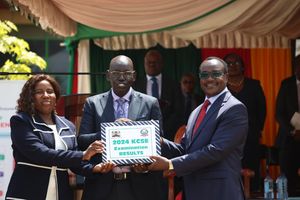Ministry plans sensitisation tours to FGM prone counties
What you need to know:
- FGM cases have cropped up in areas which had previously made progress in its eradication.
- Gender ministry has enlisted support of security teams, religious leaders and community elders in counties where FGM is prevalent.
- Dangers of FGM include severe bleeding, problems while urinating, infections, cysts, infertility, increased risk of childbirth complications and newborn death.
The government has raised concern over the increase in Female Genital Mutilation (FGM) practices in the country during the Covid-19 pandemic.
Of major concern is that the cases have cropped up in areas which had previously made progress in the vice’s eradication according to Public Service and Gender Affairs Chief Administrative Secretary (CAS) Rachel Shebesh.
The ministry has now enlisted the support of security teams, religious leaders and community elders in 22 counties where the illegal practice is prevalent.
The counties are Kajiado, Narok, Samburu, Laikipia, Migori (Kuria), Kisii, Nyamira, Meru, Embu, Mandera, Wajir, Garissa, Tana River and West Pokot.
Others are Baringo, Elgeyo Marakwet, Isiolo, Marsabit, Bungoma (Mt Elgon), Bomet, Taita Taveta.
"We are in a situation where Kenyans are being directed to stay at home to curb widespread of the virus. We have noticed that we are regressing in some of the areas where we had progressed. FGM is now being done in the confines of homes where people are being told to stay safe," she said.
Although it has no health benefits, young girls are subjected to the dangers of FGM — including severe bleeding, problems while urinating, infections, cysts, infertility, increased risk of childbirth complications and newborn deaths.
EARMARKED COUNTIES
Among the many myths surrounding FGM is that it’s a religious and cultural rite of passage practised by different communities.
The CAS spoke at Nanyuki where she inspected various projects rolled out by the National government including the rehabilitation of the Nairobi-Nanyuki old metre-gauge railway line.
Her ministry will this week start traversing the 22 earmarked counties to sensitize stakeholders to upscale their efforts in fighting FGM.
The World Health Organisation estimates that 120 to 140 million women and girls have been subjected to FGM.
Further, 91.5 million females over nine years in Africa are living with the consequences of the heinous act, which is practised in 30 countries in the continent and in others in Asia and the Middle East.





